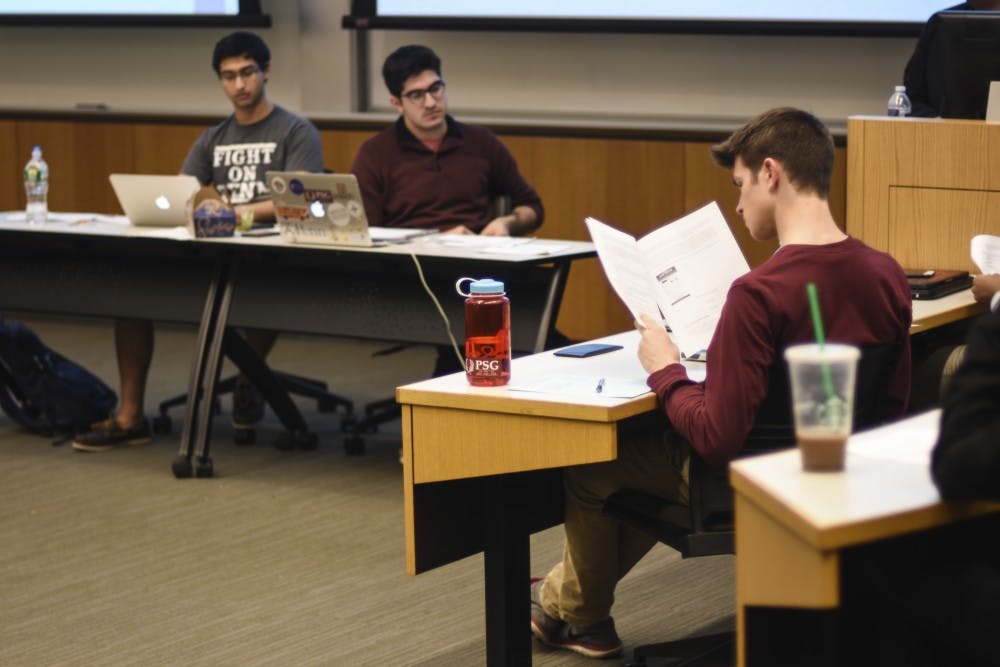
College senior and UA President Kat McKay says that by decreasing the cost of some Class Board events, the UA hopes to "make it so that your family’s income doesn’t determine whether or not you can participate in Class Board events."
Credit: Joy LeeThe Undergraduate Assembly passed its budget for next year, and Class Board events like Hey Day will be cheaper and more accessible because of it.
Two of the biggest changes this year in the UA’s 2017-2018 budget include a 22 percent increase in UA operations and administration funding and a $26,000 increase in Student Activities Council funding.
College junior and UA Treasurer Michelle Xu said the 22 percent increase from $4,980 to $6,085 in the UA operations and administration grant occurred because Penn is hosting an upcoming conference for the Philadelphia Big 5 — Penn, La Salle University, Saint Joseph’s University, Temple University and Villanova University.
The conference is for members of student government to discuss issues, make suggestions for improvement and share general ideas. College senior and UA President Kat McKay said Penn has not hosted this conference during her tenure on the UA. According to Xu, the location rotates so that it only occurs at each school once every five years.
“It was so helpful to meet these other student government leaders and get their perspective on issues that affect the student-city community,” McKay said.
In addition to increased funding for the Big 5 conference, funding for junior and senior Class Boards increased by 3.17 percent and 2.79 percent, respectively. Each received a $1,000 increase in its budget.
McKay said that the UA wants to make Class Board events, like Hey Day, more affordable and accessible to all Penn students regardless of socioeconomic status.
“It’s visibly clear who participates in something like Hey Day,” McKay said. “We want to make sure everyone can participate.”
According to McKay, the Hey Day package decreased from $35 to $20 between 2015 and 2016. She said she thinks Class Board 2018 now plans to make the price even lower.
“The goal is to make it so that your family’s income doesn’t determine whether or not you can participate in Class Board events,” McKay said.
Xu pointed out that the increase in funding to the junior and senior Class Boards was prompted by student feedback. She encourages student input in the budget because “every dollar goes to student activities.”
McKay agreed with Xu, noting that UA members get to determine the student body’s operating budget. Their contingency of $16,000 also serves as a source of funding with “very few restrictions” for which any student can apply.
“Students don’t recognize the power of the UA to help them,” McKay said. “In times of need or in times of crisis or when your group perceives an issue, students can come to the UA, so that we can, at the very least, help connect you to the right people at Penn to fix that issue.”
Xu also noted that the budgeting committee — consisting of Xu, College freshman Max Grove and Wharton sophomore Nile Nwogu — prioritized SAC this year, granting it $1.26 million of the $2.4 million total budget.
College and Wharton junior and SAC Chair Edward Jing said money allocated to SAC is divided among the approximately 200 student groups that SAC funds. Xu said that she was “particularly happy with the amount that SAC got” because SAC recognized 12 new clubs this year.
“I am very optimistic about the budgeting we received,” Jing said.
The Daily Pennsylvanian is an independent, student-run newspaper. Please consider making a donation to support the coverage that shapes the University. Your generosity ensures a future of strong journalism at Penn.
Donate







